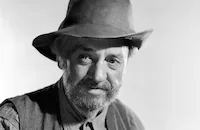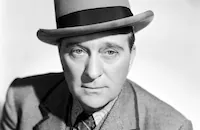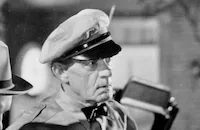True Confession

Brief Synopsis
Cast & Crew
Wesley Ruggles
Carole Lombard
Fred Macmurray
John Barrymore
Una Merkel
Porter Hall
Film Details
Technical Specs

Synopsis
Helen Bartlett, fiction writer and chronic teller of fibs, is happily married to honest lawyer Ken, but they are broke. Helen secretly gets a job as a secretary, but quits her first morning when her boss, Otto Krayler, proves to be a lecherous wolf. When she returns later for her hat and coat, Helen is charged with murder. The apparent motive for the crime is $12,000, which strangely was left in Krayler's desk. When Helen is cross-examined, she paints a vivid scenario of her guilt, then says she is innocent. Ken visits Helen in her jail cell and, fearing there is no way to prove her innocence, decides to plead self-defense, hoping to win the jury's sympathy for a woman protecting her honor. Throughout the trial, all assume Helen is guilty except a mysterious man named Charley Jasper, who calls himself a criminologist and "student of life." The Bartletts win the case after much publicity, and Helen publishes her life story, becoming a wealthy novelist. At their new home on Martha's Lake, Ken feels guilty that crime catapulted them to success, and Helen is ready to confess her innocence when Ken states categorically perjury is a travesty of justice worse than murder. Charley visits the Bartletts carrying Krayler's wallet, and hopes to blackmail them with knowledge of Helen's perjury by confessing to the murder himself. Helen finally tells Ken the truth, and he threatens to turn Charley in until he confesses the real murderer was his brother-in-law, who panicked after killing Krayler and abandoned the money, then was himself killed during an attempted bank robbery. Ken, disillusioned by Helen's constant lying, leaves, but she runs after him, lying that she's pregnant, then insisting it could be true. Ken then carries Helen into the house in order to make one last attempt to teach her not to lie, and she assures him she has uttered her last fib.

Director

Wesley Ruggles
Cast

Carole Lombard

Fred Macmurray

John Barrymore

Una Merkel

Porter Hall

Edgar Kennedy

Lynne Overman

Irving Bacon

Fritz Feld

Richard Carle
John T. Murray
Tommy Dugan
Garry Owen

Toby Wing

Hattie Mcdaniel
Eleanor Fisher
Bernard Suss
Pat West
Herbert Ashley
Dudley Clements
Walter Soderling
Jim Toney
Gertrude Simpson
Chester Clute
Irving White
George Ovey
Elmer Jerome
Peggy Leon
Jane K. Loofbourrow
George B. French
Anne Cornwall
Harry Fleischmann
Jack Daley
Frank Austin
Jack Kennedy
Cora Shumway
Arthur Lake
Frank Du Frane
John Nasboro
Charles Sherlock
Joyce Mathews
Dorothy Howe
Peggy Montgomery
Bradley Metcalfe
Wesley Giraud
Billy O'brien
Carmencita Johnson
Seesel Ann Johnson
Rosita Butler
Beaudine Anderson

Byron Foulger

Lew Kelly
Sharon Lewis
Franklin Parker
Art Rowlands
Ned Glass
Mark Strong
Charlotte Dabney
Wally Maher
Clarence L. Sherwood
Marty Faust
Don Roberts
Norah Gale
Harriette Haddon
Alma Ross
Blanca Vischer
Nick Copeland
Monte Vandergrift
George Guhl
Peggy Ward
Gloria Williams
Grace Goodall
Crew
Travis Banton
Claude Binyon
Sam Coslow
Hans Dreier
A. E. Freudeman
Earl Hayman
Frederick Hollander
Frederick Hollander
Arthur Jacobson
Don Johnson
William Lebaron
Albert Lewin
Boris Morros
Wesley Ruggles
Ted Tetzlaff
Robert Usher
Paul Weatherwax
Adolph Zukor

Videos
Movie Clip


Hosted Intro
Film Details
Technical Specs

Articles
True Confession
Lombard stars as Helen Bartlett, a wife whose overactive imagination leads her to exaggerate, evade the truth, and misrepresent problems to her husband Kenneth, especially on matters of money. Typical of screwball comedies, Kenneth, played by Fred MacMurray, is the opposite of Helen, which creates the friction that leads to comic escapades. Kenneth is a straight-laced dullard who does not appreciate Helen's flights of fancy, and he is so stubbornly truthful that he refuses to take on clients who are guilty. Small wonder the couple is experiencing money problems. Helen lands a job as a part-time secretary to ease their sagging finances, but she quits the first day after the boss chases her around the desk. Later, she slips back to the office to retrieve her coat only to learn the old skirt-chaser has been murdered. Helen becomes the primary suspect, though she is innocent of the crime. Circumstances lead her to falsely confess to murder, with Kenneth defending her when she goes on trial.
True Confession was not only Lombard's last film under her contract with Paramount but the end of a successful string of romantic comedies, which earned her the nickname "Queen of the Screwballs." The film keeps within the conventions of the screwball genre, but the character of Helen Bartlett stretches the limits of Lombard's comic persona. Known onscreen and off as a free spirited nonconformist, Lombard played eccentric innocents who found themselves in deep trouble--or deeply in love--before realizing it. She infused her performances with a manic energy, speaking quickly with a lilt in her voice. The result was a succession of zany, goofy characters who still managed to be likable and sympathetic. Helen Bartlett tests the boundaries of Lombard's persona because the character's solution to problems is to spin tall tales, which makes her a kind of liar. Watching Helen be untruthful about the smallest of incidents pushes the believability of her character as well as the audience's sympathy. Whether viewers will enjoy True Confession depends on their willingness to accept the premise of the film, which is Helen's almost pathological lying.
The Production Code Administration, which controlled the Motion Picture Production Code (Hays Code) during the Golden Age, found problems during the script stage of this screwball comedy. PCA administrator Joseph Breen disapproved of the way Helen's lies played havoc with the institution of law and order, maintaining that they represented a travesty of justice. Breen also took issue with the original ending in which Helen claims to be pregnant but Kenneth refuses to believe her. After she tells him, "It could be true," Kenneth throws her over his shoulder and heads toward their bedroom, suggesting they are about to have sex. Breen demanded all of the dialogue relating to Helen's declaration of pregnancy be removed as well as a shot of her grabbing Kenneth's trousers out of his hands. (He is clad in swim trunks.) The PCA wanted the scene to suggest that Kenneth was carrying his wife off-screen in order to spank her, as though hitting and humiliating one's wife was preferable to making love to her. Director Wesley Ruggles was incensed by the PCA's demands. In a meeting with Breen and his staff, which was recounted in a PCA memo, Ruggles accused them of reading "dirty things" into movies in general. Producer Albert Lewin tried to calm the PCA by declaring that the ending was not going to be shot as written, but his vague promises were not enough for Breen.
The stalemate resulted in MPPDA president Will H. Hays stepping in to resolve the situation. In Breen's name, he granted a certificate of approval because the farcical tone of the film, particularly in the scenes in the courtroom, prevented it from being offensive. The film's conclusion retains Helen's claims that she is pregnant, but the setting was changed, so Kenneth's intent in throwing his wife over his shoulder is ambiguous.
Lombard was a major star by the time she was cast in True Confession. Throughout the 1930s, her romantic comedies had garnered critical acclaim and box office success. My Man Godfrey (1936) became a career high point when she was nominated for an Academy Award as Best Actress. Though she exhibited terrific chemistry with ex-husband William Powell in that screwball classic, her primary onscreen partner during this period was Fred MacMurray. She appeared for the first time with the affable actor in a comedy called Hands Across the Table in 1935, which led to three additional pairings over the next two years, The Princess Comes Across (1936), Swing High, Swing Low (1937), and True Confession (1937) .
The success of Lombard's comedies gave her clout with the studio that other stars did not enjoy. She flexed her muscle behind the scenes of True Confession in terms of casting and script development. One of the conventions of screwball comedy is the array of eccentric or unique supporting characters that give a film texture. In True Confession, the most bizarre character is a well-spoken gentleman named Charley Jasper who insists that he killed the victim. Charley is irritated that Helen is getting all the attention for the murder, but he has a history of false confessions and cannot be believed. Lombard requested that her friend and costar from Twentieth Century (1934), John Barrymore, be cast in the role. In the three years since the two had appeared together, Barrymore's health had rapidly deteriorated due to excessive alcohol abuse. Not only did he lose his handsome looks, but he was considered unreliable. His career was reduced to roles in b-movies and film series. Lombard insisted that scriptwriter Claude Binyon enhance the role of Charley Jasper and that Barrymore get third billing on the same title card after her and MacMurray.
Lombard also tried to get a small role for Evelyn Brent, an actress she knew from earlier in her career. However, director Wesley Ruggles wanted someone else for the part, and the star was unsuccessful in landing a role for Brent.
Contemporary critics and Lombard's biographers disagree over the quality or impact of True Confession. Biographers Wesley D. Gehring and Ray E. Boomhower refer to it as an "underrated gem," while researcher and historian Robert Matzen calls it a "blunder." However, at the time of release, True Confession became another box office hit and critical success for Lombard.
By Susan Doll
Producer: Albert Lewin for Paramount Pictures
Director: Wesley Ruggles
Screenplay: Claude Binyon from the play Mon Crime by Louis Verneuil and Georges Berr
Cinematography: Ted Tetzlaff
Editor: Paul Weatherwax
Costume Designer: Travis Banton
Original Music: Frederick Hollander, directed by Boris Morros
Art Direction: Hans Dreier and Robert Usher
Cast: Helen Bartlett (Carole Lombard), Kenneth Bartlett (Fred MacMurray), Charley Jasper (John Barrymore), Daisy McClure (Una Merkel), Prosecutor (Porter Hall), Darsey (Edgar Kennedy), Bartender (Lynne Overman), Coroner (Irving Bacon), Krayler's Butler (Fritz Feld), Judge (Richard Carle), Otto Krayler (John T. Murray), Typewriter Man (Tommy Dugan), Tony Krauch (Garry Owen), Suzanne Baggart (Toby Wing), Ella (Hattie McDaniel)

True Confession
Quotes
Trivia
Notes
According to an early treatment, the play was translated from the French by Estelle Newburgh. This film's working title was Mon Crime. The film wound up Carole Lombard's eight-year contract with Paramount and was producer Albert Lewin's first for the studio. Throughout the film, Lombard literally thrusts her tongue in her cheek when she fibs. The trailer for this film, entitled "Little White Lies," featured Lombard as herself, Edgar Kennedy, and a lie detector. An early production chart lists William Collier, Sr. in the cast, but his participation in the final film has not been determined.
According to files in the MPAA/PCA Collection at the AMPAS Library, this film initially was not approved by the PCA because, in the words of PCA Director Joseph I. Breen, "there [was] no attempt to indicate that the "processes of law" are to prevail, with regard to the perjury of Helen." In a letter dated August 31, 1937, Breen wrote to Paramount producer John Hammell stating, "...there should be some indication at the end of this story that Helen's technical perjury is to be confessed to the proper legal authorities....We think you might easily meet with this technical objection under the Code by the insertion of a line, spoken, possibly by MacMurray, suggesting that he feels bound to make known to the judge, or the district attorney, or whoever is the proper person, that his wife has been guilty of perjury and that she will have to take the consequences-that he is helpless to save her-or some such line. If such a line could be inserted, we feel that from the standpoint of the Code the picture could be made acceptable....It is our considered judgment that these court scenes...suggest the possibility of their being interpreted as a "travesty on the courts and the administration of justice." Such an interpretation would be enormously dangerous from the standpoint of general industry policy." On September 27, 1937, Breen again wrote to Hammell stating that the film was still unacceptable. The letter states, "We refer to the play upon Helen's suggestion that she is pregnant and the further action and dialogue which suggests that Ken carries her into the bedroom for the purposes of making her lie come true. We earnestly recommend that you delete from your picture all suggestions having to do with the sexual relationship between Ken and Helen....the business of showing Helen taking Ken's trousers from him should be dropped. The dialogue about the baby and the doctor should also be dropped. Particularly important is the necessity for deleting the line, "Well, it could be true," which plants and points up the suggestiveness of Ken carrying her into the bedroom."
On September 30, 1937, following a meeting among Hammell, Lewin, director Wesley Ruggles and Geoffrey Shurlock, assistant to Breen, Hammell wrote the following to Breen: "we will shoot the ending of the picture as you read...exercising in the handling of same that care and good taste explained to you verbally so that there will be nothing whatever of an offensive nature in this ending which can be interpreted as a violation of the Code." A memo about the meeting written by PCA official Islin Auster for the PCA files states: "Mr. Ruggles arrived with the brusque announcement that he had only three minutes to give to the discussion, that he was mad, and wanted to know what the "score" was. He wound up with the repeated announcement that we read "dirty things" into scripts. Upon my insistence that this was not true, he left the conference. When I asked what the scene intended to convey, if not the husband's intention of sleeping with his wife, Mr. Lewin vaguely explained something about good taste, mood, and said that some people could get out of it whatever they chose....[Lewin] incidentally explained that the scene was not actually to be shot as written; that is, the set would not contain stairs to a bedroom. Ken would simply carry his wife out of the room. Mr. Shurlock expressed the opinion that this change might helpfully effect the flavor of the scene....no mention was made by the gentlemen of Paramount of the fact that our letter of August 31 set forth our understanding that the ending was still open to objection and gave clear indication that the scene should be handled to indicate that Ken was going to spank his wife."
On November 19, 1937, MPPDA President Will H. Hays wrote the following to Adolph Zukor, Paramount's Chief Executive: "I have directed Mr. Breen to issue the formal certificate of approval for this production. In doing this, I wish to make it clear, for the record, that it is my judgment that the scenes under discussion are of questionable acceptability and are saved from positive offense by the general farcical nature of the entire production and the grotesqueness of the scenes in the court....there is great danger, from a social standpoint, in suggesting by way of the screen, a too-flippant portrayal of the courts of justice." This film was remade by Paramount in 1946 as Cross My Heart, directed by John Berry and starring Betty Hutton, Sonny Tufts, and Michael Chekhov.















